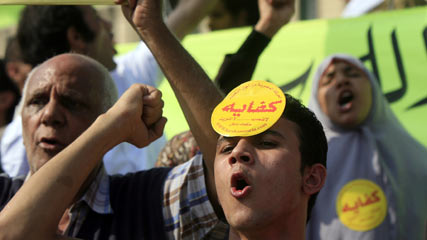The anti-terrorism law project boosts motivation for extremism and terrorism, the Egyptian Initiative for Personal Rights (EIPR) said in a Tuesday statement, signed by 17 renowned local NGOs.
EIPR added that the law will lead to the destruction of the state’s institutions.
The NGOs said they firmly oppose the law, which was endorsed by the government and is awaiting the presidency’s final approval.
“The law is a clear infringement of constitutional rights as it paves the way for an unofficial state of emergency that is indefinite in time and has exceptional judicial measures,” the joint statement added.
“We do not defend terrorism, unlike some claim, but we are afraid that the law will destroy the pillars of the state of law, especially the judiciary,” the statement said.
The NGOs explained that several procedures will be changed in exceptional courts during trials. Most importantly, they will affect the defendants’ right to appeals.
The problem, from their point of view, is not the legal penalties in themselves – most punishment under the law ranges from 5 to 10 years in prison. “We are fully aware of the threats posed by extremist violent groups,” the statement said.
“However, because the legal terms are vague, its application would not differentiate between the activities of terrorist groups and non-terrorist institutions such as peaceful political parties, NGOs and press institutions,” NGOs explained.
The first article of the proposed law defines terrorism, what is considered a terrorist activity, funding terrorism. According to the article, the label “terrorist group” is given to “any group, association, organisation, institution, regardless of its legal status, or mob composed of three persons or more, that aims at or engages in a terrorist act.”
Yet, the “terrorist act” itself is only described as “every crime involving a terroristic means or has a terrorist goal or calls for committing a crime”.
Besides backing up arguments by the Press Syndicate regarding the legal restrictions to be imposed on the press and media, EIPR reported on a several points that are controversial to NGOs.
Civil organisations who’ve participated in the statement include the Association for Freedom of Thought and Expression (AFTE), El-Nadeem Centre for the Rehabilitation of Victims of Violence, Al-Haqanya and Hisham Mubarak law centres and the Egyptian Commission for Rights and Freedoms (ECRF).
Like the controversial Protest Law and parliamentary laws, the counter-terrorism law could be contested before the Supreme Constitutional Court (SCC) on grounds of non-constitutionality, once it is passed.







